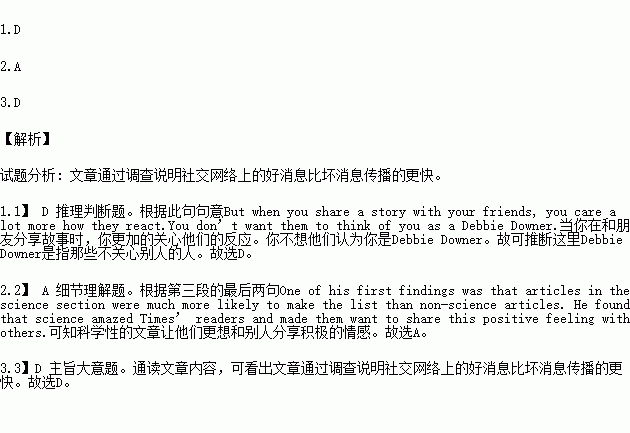题目内容
Bad news sells. If it bleeds, it leads. No news is good news, and good news is no news. Those are the classic rules for the evening broadcasts and the morning papers. But now that information is being spread and monitored in different ways, researchers are discovering new rules. By tracking people’s e-mails and online posts, scientists have found that good news can spread faster and farther than disasters and sob stories.
“The ‘if it bleeds’ rule works for mass media,” says Jonah Berger, a scholar at the University of Pennsylvania. “They want your eyeballs and don’t care how you’re feeling. But when you share a story with your friends, you care a lot more how they react. You don’t want them to think of you as a Debbie Downer.”
Researchers analyzing word-of-mouth communication—e-mails, Web posts and reviews, face-to-face conversations—found that it tended to be more positive than negative, but that didn’t necessarily mean people preferred positive news. Was positive news shared more often simply because people experienced more good things than bad things? To test for that possibility, Dr. Berger looked at how people spread a particular set of news stories: thousands of articles on The New York Times’ website. He and a Penn colleague analyzed the “most e-mailed” list for six months. One of his first findings was that articles in the science section were much more likely to make the list than non-science articles. He found that science amazed Times’ readers and made them want to share this positive feeling with others.
Readers also tended to share articles that were exciting or funny, or that inspired negative feelings like anger or anxiety, but not articles that left them merely sad. They needed to be aroused (激发) one way or the other, and they preferred good news to bad. The more positive an article, the more likely it was to be shared, as Dr. Berger explains in his new book, “Contagious: Why Things Catch On.”
1.What can we infer about people like Debbie Downer?
A. They’re socially inactive.
B. They’re good at telling stories.
C. They’re careful with their words.
D. They’re inconsiderate of others.
2.Which tend to be the most e-mailed according to Dr. Berger’s research?
A . Science articles. B. Sports news.
C. Personal accounts. D. Financial reviews.
3.What can be a suitable title for the text?
A. Sad Stories Travel Far and Wide
B .Online News Attracts More People
C. Reading Habits Change with the Times
D. Good News Beats Bad on Social Networks
 全能练考卷系列答案
全能练考卷系列答案Anything that poses a challenge or a threat to our well-being is a stress.Some stresses get you going and they are good for you – without any stress at all many say our lives would be boring and would probably feel pointless. However,when the stresses undermine both our mental and physical health they are bad.In this text we shall be focusing on stress that is bad for you.
When we are stressed the following happens:
Blood pressure rises
Breathing becomes more rapid
Heart rate (pulse) rises
Muscles become tense
We do not sleep (heightened state of alertness)
Most of us have varying interpretations of what stress is about and what matters.Some of us focus on what happens to us,such as breaking a bone or getting a promotion,while others think more about the event itself.How you see that stressful event will be the largest single factor that impacts on your physical and mental health.Your interpretation of event and challenges in life may decide whether they are invigorating or harmful for you.
There are three broad methods you can follow to treat stress.
Self help for treating stress
Exercise has been proven to have a beneficial effect on a person's mental and physical state.For many people exercise is an extremely useful stress buster.
Alcohol and drugs will not help you manage your stress better.Either stop consuming them completely,or cut down.
If you consumption of coffee and other drinks which contain caffeine is high,cut down.
Eat plenty of fruit and vegetable.Make sure you have a healthy and balanced diet.
Talk to your family,friends,work colleagues and your boss.Express your thoughts and worries.
Stress management techniques
Stress management can help you t keep away from the source of stress,change the way you view a stressful event,and lower the impact that stress might have on your body.Stress management therapy will have the objective of pursuing one or more of these approaches.
Medicines
Doctors will not usually prescribe medications for coping with stress,unless the patient has an underlying illness,such as depression or some type of anxiety.If that is the case,the doctor is actually treating a mental illness.In such cases,an antidepressant may be prescribed.Bear in mind that there is a risk that all the medication will do is mask the stress,rather than help you deal and cope with it.
Stress | |
Passage outline | Supporting details |
Understanding of stress | • Stress is pressure or worry 1.by the stressors in your life. • Some stresses2.you while some others make you suffer. |
3.of stress | • You have 4.blood pressure. • Your heart5.f aster. • Your become sleepless. • Your breath and muscles are abnormal. |
Attitudes towards stress | • You care about what concerns6. • You pay attention to what is7.around you. • Above all,how you look at challenges affects your health. |
Ways to deal with stress | • Exercise,a proper diet,communication help to 8.your stress while alcohol,drugs and coffee do not. • Stress management guides you how to 9.and reduce stress. • Medicines can be used to treat a mental illness but cannot solve the problem 10. |
任务型阅读
认真阅读下列短文,并根据所读内容在文章后表格中的空格里填入一个最恰当的单词。
注意:请将答案写在答卷上相应题号的横线上。每个空格只填1个单词。
Time management refers to managing time effectively so that the right time is allocated to the right activity. Time management is essential in every field of life because time is the precious resource one needs to accomplish a task. Every single moment that passes once will never come back again. Time management helps you do your task in time and use your time more productively. It helps you to identify the useless activities which can be avoided and how time can be saved. It helps you allocate proper time for a task and perform the task more efficiently.
A student’s daily routine is filled with a lot of activities. Some are related to his studies, some are essential for his life and some are for entertainment or physical fitness. Still some activities have no use and just waste time. Similarly if the number of the activities for entertainment exceeds what is reasonable, they waste the time of a student. These activities include using the internet for chatting, playing games, watching movies or listening to music for hours on end. Such activities are called “distracters” which distract one from one’s real purpose.
Games and physical exercise are important for a student because they keep him fit in body and mind but game time should be controlled as it may waste his time.
No one wastes time intentionally. Time is always wasted in an insensible way. That’s why a student is aware of it until the days of exams come. So it is better to use the present time more effectively than cry over what you’ve done in the future.
As for a student, time management compromises various steps. It is not only necessary to allocate time for different subjects but also to identify right time for each such subject. What’s more, to identify the distracters which become causes of wastage of time is of significance as well.
Take a pen and sheet. Write down all the activities you do in your daily routine. Calculate how much time you have for your studies other than other activities. Determine how much time a subject can take out of your total study time. See which subject need more time.
Time management
Definition | You manage your time effectively for the 1. of giving the right time to the right activity. |
Significance | ●It is essential in every field of life because of the 2. of time. ●It helps you do your task in time, use your time more productively, 3. wasting time, give proper time to a task and perform the task more effectively. |
4. | ●Identify all the activities in your daily routine and remove 5. ones. ●Strictly 6. time spent on activities for entertainment. ●Games and physical exercise are helpful to keep you fit physically and 7. , but the amount of time spent on them should not exceed what is reasonable. ●Time is always wasted in an insensible way, so take care. ●Manage the present time more effectively in order not to cry over the 8. in the future. |
Steps | ● 9. all the activities in your daily routine. ● Calculating how much time you need for your studies other than other activities. ● 10. time for different subjects. ● Identifying the right time for each subject. |

